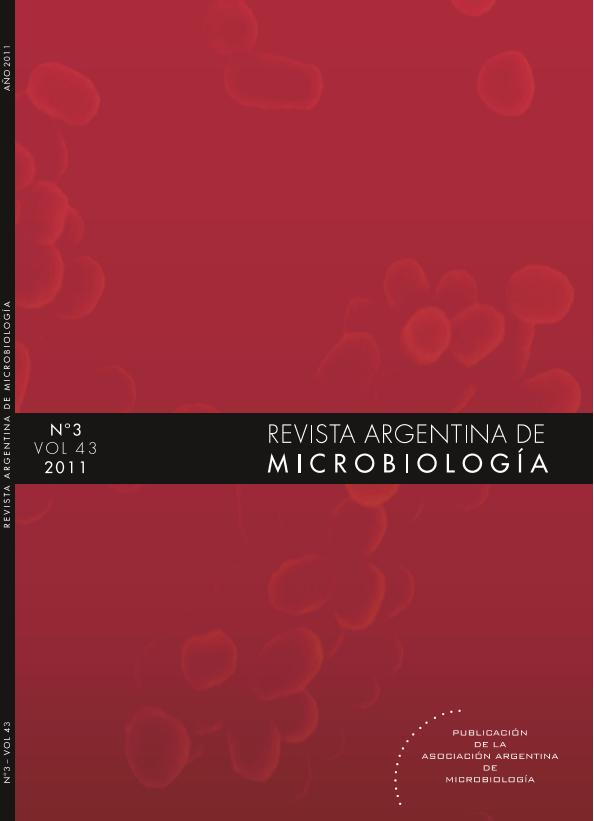Artículo
Evaluation of commercial systems VITEK 2 and API 20NE for identification of Burkholderia cepacia complex bacteria from clinical samples. Species belonging to the Burkholderia cepacia complex (BCC) are capable of causing chronic respiratory tract infections in patients suffering from cystic fibrosis as wel as in immunocompromised individuals. Most of these species are highly resistant to antibiotic therapy, generating the need for their rapid and accurate detection<br />for the proper treatment and clinical management of these patients. In this wok, the polymerase chain reaction (PCR) technique based on the amplification of the recA gene (PCR-recA) was applied for an accurate identification of bacteria belonging to the BCC. Sensitivity (S) and specificity (E) of two biochemically-based commercial automated systems, API 20NE and VITEK 2 (bioMérieux®), and of the most representative biochemical manual tests for the identification of the Burkholderia cepacia complex were herein evaluated. The commercial systems VITEK 2 and API 20NE showed the following sensitivity and specificity vaues for identification to the species level, S: 71.1 %, E: 100 %, S: 69.7 %, E: 90.2 %, respectively. More complex results were observed for phenotypic manual tests, since BCC bacteria can undergo selective pressure to survive in chronic patients causing the loss of their typical phenotypic characteristics. The PCR-recA technique was easy to implement even in medium - complexity clinical diagnostic laboratories. Species belonging to the Burkholderia cepacia complex (BCC) are capable of causing chronic respiratory tract infections in patients suffering from cystic fibrosis as wel as in immunocompromised individuals. Most of these species are highly resistant to antibiotic therapy, generating the need for their rapid and accurate detection for the proper treatment and clinical management of these patients. In this wok, the polymerase chain reaction (PCR) technique based on the amplification of the recA gene (PCR-recA) was applied for an accurate identification of bacteria belonging to the BCC. Sensitivity (S) and specificity (E) of two biochemically-based commercial automated systems, API 20NE and VITEK 2 (bioMérieux®), and of the most representative biochemical manual tests for the identification of the Burkholderia cepacia complex were herein evaluated. The commercial systems VITEK 2 and API 20NE showed the following sensitivity and specificity vaues for identification to the species level, S: 71.1 %, E: 100 %, S: 69.7 %, E: 90.2 %, respectively. More complex results were observed for phenotypic manual tests, since BCC bacteria can undergo selective pressure to survive in chronic patients causing the loss of their typical phenotypic characteristics. The PCR-recA technique was easy to implement even in medium-complexity clinical diagnostic laboratories.
Evaluación de los sistemas comerciales automátizados VITEK 2 y API 20NE para la identificación de organismos del Complejo Burkholderia cepacia aislados de muestras clínicas
Título:
Evaluation of commercial systems VITEK 2 and API 20NE for identification of Burkholderia cepacia complex bacteria from clinical samples.
Oderiz, Sebastián; Palau, María J.; del Palacio, Paula; Lewis, Miriam C.; Bettiol, Marisa Paula; Martina, Pablo F. ; Bosch, María Alejandra; Gatti, Blanca Maria
; Bosch, María Alejandra; Gatti, Blanca Maria
 ; Bosch, María Alejandra; Gatti, Blanca Maria
; Bosch, María Alejandra; Gatti, Blanca Maria
Fecha de publicación:
05/2011
Editorial:
Asociación Argentina de Microbiología
Revista:
Revista Argentina de Microbiología
ISSN:
0325-7541
e-ISSN:
1851-7617
Idioma:
Español
Tipo de recurso:
Artículo publicado
Clasificación temática:
Resumen
Archivos asociados
Licencia
Identificadores
Colecciones
Articulos(CINDEFI)
Articulos de CENT.DE INV EN FERMENTACIONES INDUSTRIALES (I)
Articulos de CENT.DE INV EN FERMENTACIONES INDUSTRIALES (I)
Citación
Oderiz, Sebastián; Palau, María J.; del Palacio, Paula; Lewis, Miriam C. ; Bettiol, Marisa Paula; et al.; Evaluación de los sistemas comerciales automátizados VITEK 2 y API 20NE para la identificación de organismos del Complejo Burkholderia cepacia aislados de muestras clínicas; Asociación Argentina de Microbiología; Revista Argentina de Microbiología; 43; 5-2011; 168-175
Compartir



